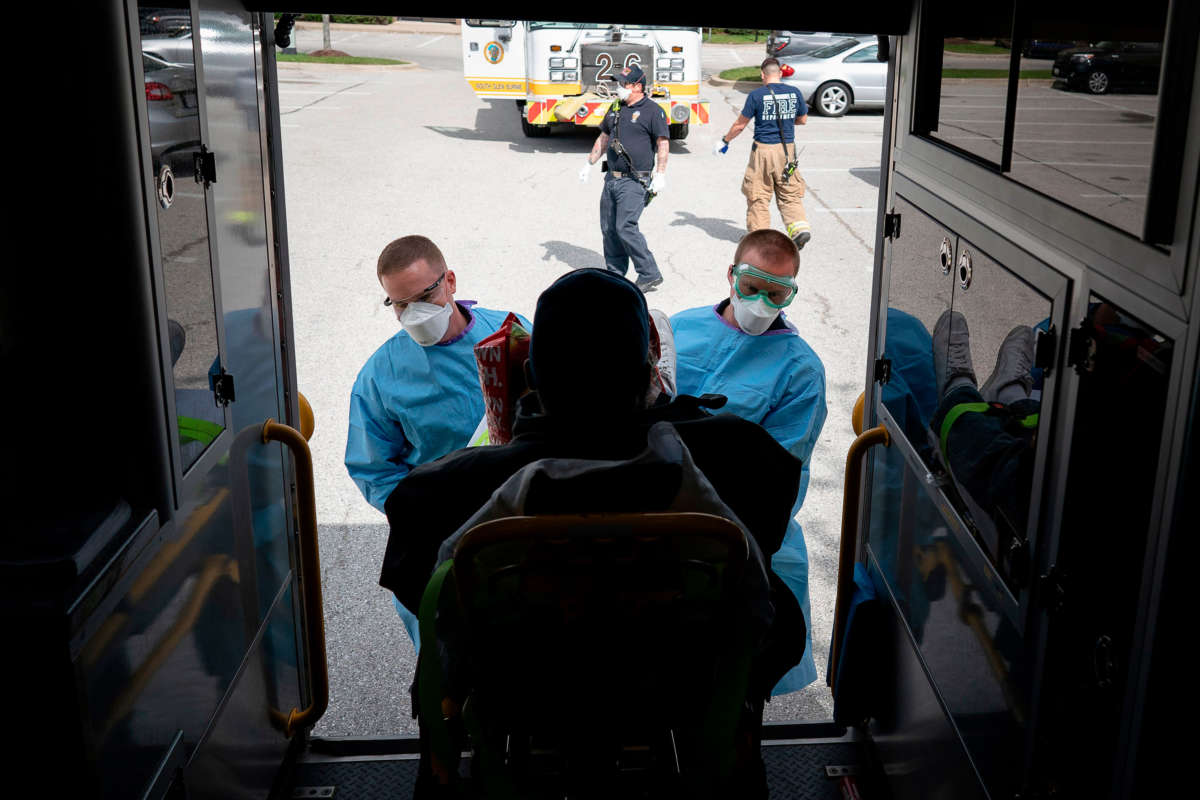Support justice-driven, accurate and transparent news — make a quick donation to Truthout today!
A newly released study from Columbia University concludes that tens of thousands of Americans likely died from COVID-19 due to the initial inaction and slow response to the disease from the Trump administration.
The study looked at the number of deaths that occurred from the start of March through May 3, at which point 65,307 Americans had reportedly died from COVID-19. Had social distancing measures been initiated one week before President Donald Trump announced his recommendations on March 16, around 36,000 lives could have been saved, the study suggested.
The study also found that deaths could have been reduced by 54,000 — a rate of more than 4 in 5 Americans who died during that time — had such measures been introduced on March 1.
“It’s a big, big difference,” epidemiologist Jeffrey Shaman, who led the research team, told The New York Times. “That small moment in time, catching it in that growth phase, is incredibly critical in reducing the number of deaths.”
The findings from the Columbia University study echo conclusions from other research published last month, in which a pair of epidemiologist researchers concluded, out of 60,000 projected deaths by August at the time, 37,000 of them could have been avoided had the administration implemented social distancing one week earlier, and 90 percent of deaths could have been avoided if actions had been taken sooner than that.
Trump announced the recommendations for social distancing and limiting public gatherings on March 16. A few days later, a number of states began issuing stay-at-home orders for their residents, shuttering businesses in the process.
Trump urged Americans at that time to make “these critical changes and sacrifices” in order to stem the spread of the disease, but up until that point he had previously downplayed the seriousness of the pandemic on a number of occasions.
On February 19, he suggested that matters would resolve themselves, if they got bad at all, when spring temperatures arrived. “I think when we get into April, in the warmer weather, that has a very negative effect on that and that type of a virus. So let’s see what happens, but I think it’s going to work out fine,” Trump said.
On February 26, he commended his administration, even though the only significant action they had taken up to that point was closing travel from China. “When you have 15 people, and the 15 within a couple of days is going to be down to close to zero,” Trump said. “That’s a pretty good job we’ve done.”
And on March 9 — one week before the social distancing recommendations were made — Trump derided his political opponents and the media for continuing to worry about the lack of a response to the disease’s spread.
“The Fake News Media and their partner, the Democrat Party, is doing everything within its semi-considerable power (it used to be greater!) to inflame the CoronaVirus situation, far beyond what the facts would warrant,” Trump wrote in a tweet.
Trump has continued to praise his own decision on closing travel from China as the most important one in combating coronavirus, saying that move “saved a lot of lives.” Other research, however, suggests that it was not as significant as he has made it out to be.
A study from Northeastern University found that closing travel from China was a good first step, but that it only delayed when the virus would arrive to the U.S., and didn’t play a role in controlling COVID-19’s spread in the country once it got here.
“Travel restrictions aren’t enough unless we couple it with social distancing,” Ana Pastore y Piontti, co-author of the study, said in early March. “And even then, it slows the arrival of the disease, but once it arrives, you need to mitigate it or else it will spread all the same.”
Trump decided to close travel to China in January, but recommendations from officials from the Centers for Disease Control and Prevention (CDC) with regard to closing travel from Europe were largely ignored at a critical time — again, in early March.
Advice from the CDC to the White House to close travel from that continent came about on March 5, but the president didn’t act upon it until March 11, as close to 66,000 Europeans were flying into the U.S. every day.
“We’ve been muzzled,” one official said of the situation. “What’s tough is that if we would have acted earlier on what we knew and recommended, we would have saved lives and money.”
Press freedom is under attack
As Trump cracks down on political speech, independent media is increasingly necessary.
Truthout produces reporting you won’t see in the mainstream: journalism from the frontlines of global conflict, interviews with grassroots movement leaders, high-quality legal analysis and more.
Our work is possible thanks to reader support. Help Truthout catalyze change and social justice — make a tax-deductible monthly or one-time donation today.
